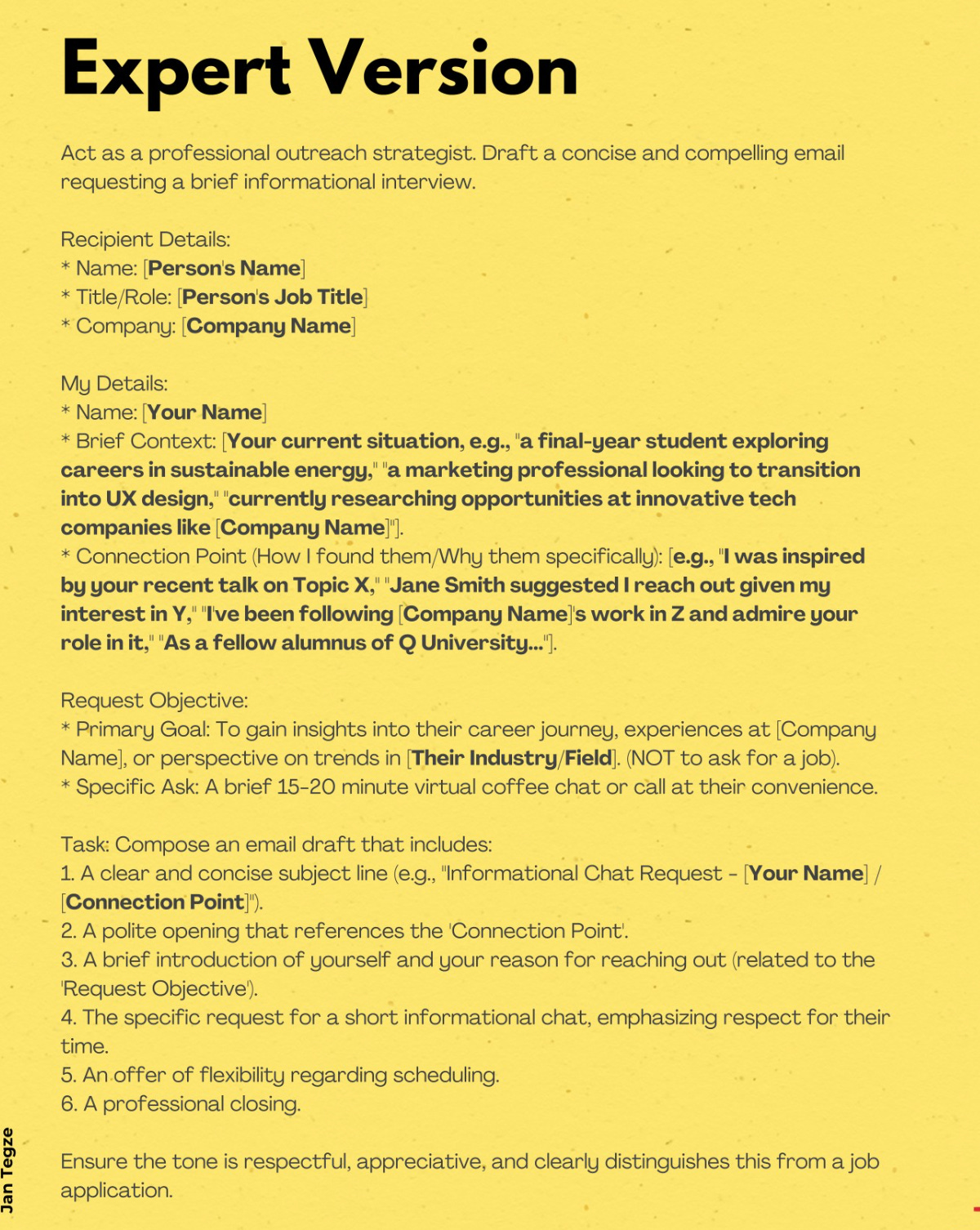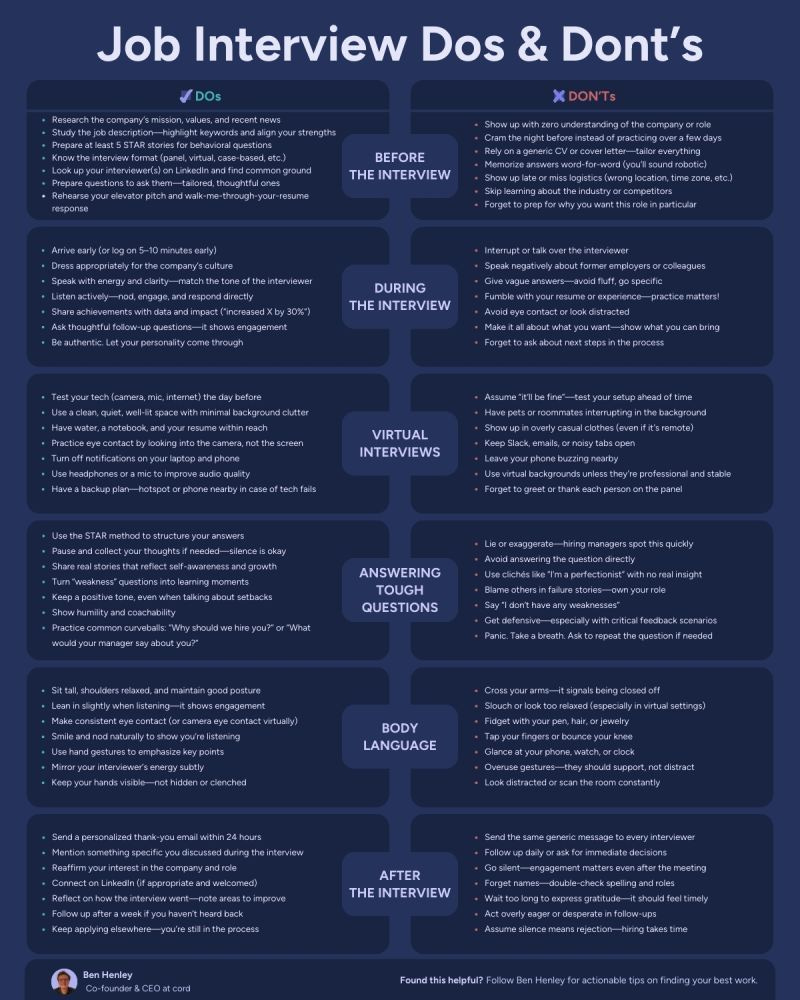Find jobs faster, interview smarter, and negotiate better
This week’s all about speed, salary, and smarter search tools.
This week, we’re focusing on how to stay one step ahead, from more innovative ways to search and apply to tools that help you negotiate better offers and prep for interviews with confidence.
This week you’ll learn:
A simple trick to get ahead in your job search on LinkedIn.
How to confidently negotiate your job offer (with a ready-to-use AI prompt).
What’s changing on LinkedIn and why it could transform how you search for jobs.
A visual cheat sheet for acing your next interview.
A sneak peek at a new AI tool that applies for jobs on your behalf.
Plus: navigating internal job moves on this week’s podcast.
Let’s dive in 👇
Use this secret LinkedIn trick to find jobs posted minutes ago
Getting your application in early can dramatically increase your chances, especially for high-volume roles. This trick lets you find the most recently posted LinkedIn jobs by editing the text string in the search bar.
Why this matters:
It surfaces jobs that haven’t yet flooded with applications
It’s faster than LinkedIn’s own filters
You can create bookmarks for different industries or keywords
Use this for a competitive edge, especially in industries where speed matters.
Jan Tegze: A ready-to-use AI prompt to negotiate job offers
Most people don’t know how to start a negotiation conversation—this prompt solves that. Jan Tegze shared a ChatGPT template to write a polite, professional email that asks for more without sounding like a demand.
It’s not about rejecting an offer—it’s about opening a respectful conversation. The prompt helps you:
Reference your offer and express appreciation
Frame your salary request around research, skills, and market value
Stay professional, not pushy
You can copy/paste it directly into ChatGPT or use it to guide your own draft. This makes negotiating easier for anyone who is nervous about it.
Basic Prompt:
----------------
Help me write an email to negotiate a job offer.
To: [Hiring Manager’s Name] ([Their Job Title] at [Company Name])
From: [Your Name]
Context: I received a job offer for [Job Title] at [Company Name].
Goal: Negotiate for a higher salary or improved offer.
Request: Ask respectfully for a salary adjustment based on my research, skills, or market standards.
Tone: Polite, professional, and appreciative of the offer.
-----------------
LinkedIn is removing filters—and replacing them with natural language job search
📄 Read the breakdown by Hannah Morgan
I mentioned it coming just a month ago, and this is one of the most significant shifts in how LinkedIn works for job seekers.
You’ll soon be able to search using plain language instead of keywords or job titles. Examples shared by LinkedIn:
“I want to use my marketing skills to help cure cancer”
“Find me sales manager roles in the automotive industry”
“Entry-level jobs for psychology majors interested in HR”
What’s coming:
Smart results based on your experience, interests, and profile
Filters for salary, remote/hybrid roles, and job types
Improved relevance—fewer ghost listings, more matches
It’s designed for people who don’t speak “recruiter” fluently. Great for career changers, students, and anyone tired of keyword guesswork.
Visual of the week: The ultimate interview prep checklist
📄 Read the full post by Ben Henley
Ben Henley shared an interview cheat sheet that every job seeker should read. It covers six stages of the process:
Before the interview – how to prep like a pro (his words not mine)
During the interview – what to say (and what not to)
Virtual interviews – tips to avoid tech or environment fails
Answering tough questions – how to stay calm and structured
Body language – subtle cues that show confidence
After the interview – smart follow-up moves
It’s clear, concise, and based on patterns Ben’s seen from interviewing 1000+ candidates. Save it, print it, and use it as a checklist before your next call.
ApplyIQ: Adzuna’s new AI job agent is looking to change job search
Adzuna has just launched ApplyIQ—a free, ethical AI job search assistant that auto-applies to only relevant roles.
Apparently (according to Doug) it’s built to solve two big problems:
Too many low-quality, spammy applications from “Easy Apply” tools
Recruiters being overwhelmed with unqualified candidates
What ApplyIQ does differently:
Strict matching algorithm (rejects 1 in 5 standard applications)
Only active job seekers can use it
No resume manipulation—your CV stays authentic
Quality > quantity: average of 5 apps per week
Limits multiple applications to the same employer
It’s early-stage, but it shows where job search is headed: AI-powered, focused, and respectful.
Try it here:
→ US version
→ UK version
Please let us know what you think of the platform. I see more innovation happening in this space and would love to have real feedback from candidates on these tools.
🎙 Podcast: How to get promoted without leaving your company
▶️ Watch on YouTube | 🎧 Listen on Spotify
Career coach and ex-recruiter Farah Sharghi joined Matt on the Open to Work podcast to discuss internal job moves, including how to prep, play the politics, and advocate for yourself without stepping on toes.
Topics Matt covered:
How internal interviews differ from external ones
What hiring managers are really looking for in internal candidates
Managing your internal reputation
Tips for navigating awkward manager conversations
When to push, when to wait
This episode is packed with advice for anyone eyeing a promotion or trying to move laterally without leaving the company.
Thank you for being part of the Open to Work Community.
Please share with others and spread the message.
If you have any questions, feedback, or topics you'd like covered, just reply—I’d love to hear from you.
Stay motivated and keep upskilling yourself to land the next job.
Warm regards,
Darren Bush
opentowork.community | LinkedIn | Twitter



